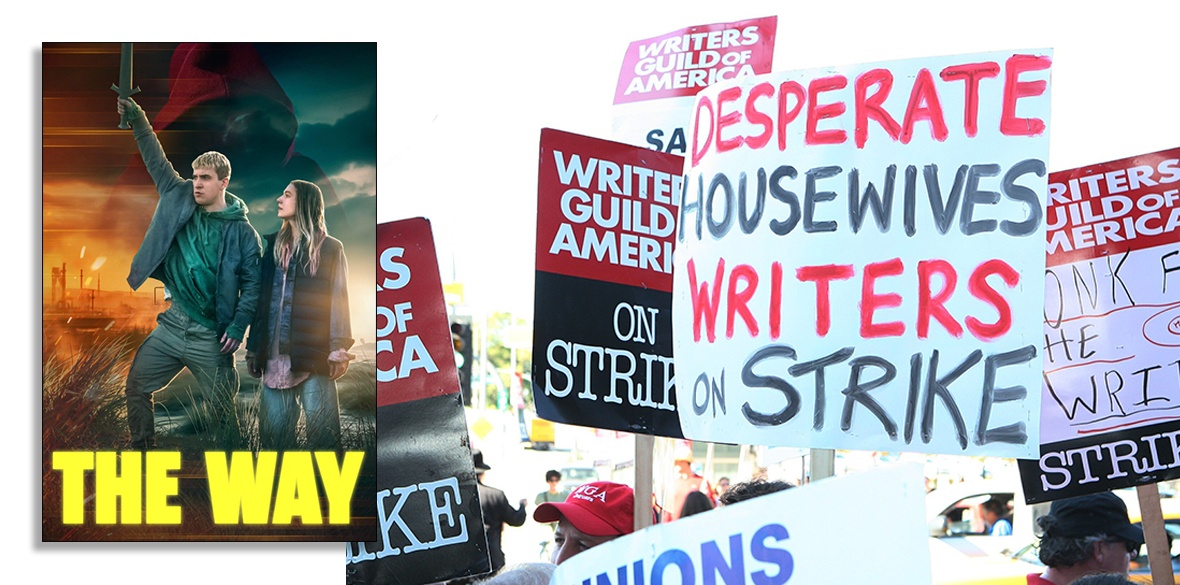This is the last article you can read this month
You can read more article this month
You can read more articles this month
Sorry your limit is up for this month
Reset on:
Please help support the Morning Star by subscribing here
The Way
BBC iplayer
“I’M mad as hell and I’m not going to take this any more,” about-to-be-fired news anchor Howard Beale screams in a television rant, urging everyone to go to the window and yell the same thing.
This scene from the film Network, much honoured and claimed to be prescient, in fact represents simply mindless ungrounded fear, vaguely articulated, not drawn from the specific material aspects of people’s lives and thus open to a kind of manipulation that can easily be converted into simple resentment and will become the basis of today’s populism.
Unfortunately, just such ungrounded impulses, after 45 years of devastation wrought by Reagan/Thatcher et al’s austerity and neoliberalism, are the basis of the BBC series The Way. It is a by-product of documentary film-maker Adam Curtis, who helped conceptualise the three-part series, who contributes not inconsiderable strengths (such as tracing advertising industry manipulation in The Century of the Self) but also glaring weaknesses (evidenced in the more recent anti-revolutionary, rabid anti-populism of Can’t Get You Out of My Head).
The Way blends a loosely constructed family fiction, around the Welsh steel and former mining town of Port Talbot, with documentary footage of the 1984 miners’ strike and a mythical otherworldly aspect that summons King Arthur’s pulling the sword from the stone. It has lifted the series title phrase “The Way” from the Star Wars’ world’s Mandalorian code of conduct, and the image of a proselytising Red Monk who kick-starts a town rebellion from Scottish folklore.
Into the soup is thrown the actual condition of the steelworks, with an Indian owner (in the series Japanese) who is always on the verge of closing the plant.
The problem, and this is a Curtis mainstay, is that the characters are utterly deceived by a passive, mediatised lifestyle: Owen the lead character, who “can’t remember the last time I felt anything,” is, as his love interest describes, “a drug addict in recovery dealing drugs,” to which her response is: “I don’t care, it’s not my business.”
This passivity and foolishness influences their actions as workers. A strike is called for at the plant before the decision is made to close it. Unlike the actual situation in Port Talbot no immediate closure is threatened. Owen tosses a lead pipe, which ignites a confrontation with the police, echoing the bone thrown across the ages in 2001: A Space Odyssey, only this time signalling the breakdown of labour relations, and civilisation itself, rather than, as in Kubrick’s film, signifying its terrifying advance.
Wales is sealed off from “Britain” and thus begins in Episode Two the family’s own odyssey as they attempt to march to safety in a now open police state.
In the series, much hostility is summoned but it remains vague (“The British don’t revolt, they gripe”), with the actual problems of deindustrialisation and a devastated economy expressed in generalised slogans that do not directly confront the power structure and the massive redistribution of wealth that began in 1980 with the launching of the neoliberal era, in the moment a little after Network premiered. In that film, people start throwing their televisions out the window when they might better have stormed the television station and taken over the media means of production.
Both the original and this new iteration of an ungrounded populism give much credence to the abstract expression of grievances felt by the population, but behind each lies the firm conviction that workers are too coddled and deceived by omnipresent media to be able to do more than threaten irrational action.
This is a mindset disproven, for example, in the massive entertainment and service industry strikes which marked the summer of discontent in Los Angeles and which continue throughout the US. These strikes, though, have specific demands and represent a growing understanding and awareness by workers of not only their situation but also of how to use today’s media for their own purposes, an understanding of which in The Way is not present.
If the site of this action, the Port Talbot steel plant, actually closes, then Britain would, instead of making steel, only be fashioning steel from scraps and leftovers. In a way, The Way, with its muddled mix of genres and its deceived chaotic individuals, is also fashioned from scraps; that is, from the leftovers and the detritus of the entertainment industry and the subjectivity of its victims who, in this telling, offer only confused and unconvincing resistance.










